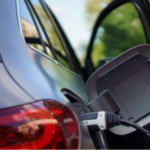
Renewable energy: what’s in it for us?
20 September 2024
Six major benefits of electric cars
20 September 2024Seven EV myths about electric cars demystified
There’s a lot of “fake news” flying around about electric vehicles (EVs) and EV charging.
Much of it ranges from the claim that electric cars are more expensive to run than their petrol-powered counterparts to the idea they’re secret pollution generators.
With EVs signalled to be standard on UK roads by 2035, Britain’s motorists must look beyond the misconceptions and scare stories. That way, they can get to grips with the real benefits of having an electric car.
So, with that in mind, we’ve decided it’s time to ditch the fiction and take a look at the real facts.
MYTH #1: EVs are more expensive to run than Internal Combustion Engine (ICE) Cars
FACT: Research shows that petrol and diesel cars are far more expensive to fuel and maintain than EVs
Buying an electric car saves motorists money in the long run.
Recent research from the Energy and Climate Intelligence Unit (ECIU) shows how the most popular petrol cars cost £700 a year more to run than EVs.
When analysing the costs of 2023’s top 10 selling EVs, the ECIU discovered that owners of these cars are likely to pay a whopping £1,300 a year LESS to run them than owners of the equivalent petrol cars.
One of the main savings is in fuel costs. This is especially true when people charge their EVs at home.
For a typical family car (the size of a VW Golf), the cost of 200 miles is under £5 when charging at home, versus £20 for petrol or diesel.
But fuel is only one of the cost savings you can expect with an electric car.
Conventional diesel and petrol cars have about 200 moving parts. From fuel filters to spark plugs, these components have to be maintained and occasionally replaced to ensure the vehicle runs well.
Because battery electric cars (BEVs) have much fewer parts, they don’t need to be serviced as much.
In fact, it’s estimated that an EV’s maintenance bills are around 43 per cent less than their internal combustion engine (ICE) counterparts.
However, there is one thing to be aware of as an EV driver: As electric cars are generally heavier than ICE vehicles, their tyres wear down faster. This means they may need to be replaced more often than the tyres on ICE vehicles.
Road Taxes and Pollution Charges
A further way electric car drivers keep more money in their wallets than petrol and diesel-engine car owners is down to road taxes.
Currently, EV owners in the UK do not have to pay road tax, known as Vehicle Excise Duty (VED). Though this will change on 1st April 2025, all newly registered EVs will still only pay VED at the lowest rate.
In addition, if you’re driving a high-polluting car in any of Britain’s emissions-based zones, such as London’s Ultra Low Emission Zone (ULEZ), you’ll have to pay a charge.
MYTH #2: Charging at home is just as expensive as public charging
FACT: Public EV charging is 20 times more expensive than home car charging
Think there’s little difference between EV home charging and public charging? Think again.
The most up-to-date data (February 2024) shows how using public charge points to power up your car can be 20 times more expensive than charging at home where you can utilise cost-saving EV tariffs.
The data, compiled by UK-based digital payment company Allstar, highlighted that home charging rates can be as low as 4p per kWh, while public prices can exceed £1.
Costs using both home EV chargers and public stations can vary depending on the supplier and the time of day you fuel up. But Allstar discovered that the greatest variances occurred in public charging rather than private.
While the most expensive home charging cost was 50p, this was still much lower than the highest-priced public charge, which came in at £1.20.
Considering the lifetime cost, it’s easy to see how using an installed EV home charger instead of public stations can save you thousands in overall vehicle running costs.
MYTH #3: EV home installations aren’t worth the investment
FACT: Your investment will not only save you money but also time
The cost of setting up an EV home charging installation can set you back £1,000 to £1,200.
Of course, this is a substantial sum.
Yet when you look at the above figures noting how much you can save by charging at home using a competitive EV tariff in comparison to how much you’ll spend when charging at a public station, you can see that your initial investment will likely be paid back within a couple of years.
Most electric car owners charge their car overnight when the off-peak rates are significantly lower. Doing so means even in a volatile energy market, they can achieve the best price possible.
In addition, they only have to pay the 5 per cent VAT on their domestic energy use. This is unlike public charging where you’ll need to stump up 20 per cent VAT.
But it’s not just the huge savings that make an EV home installation worth the investment.
The unparalleled convenience and control you have over when, where and how much you charge your electric car for many EV drivers is not only worth it—it’s priceless.
MYTH #4: EVs don’t have enough range
FACT: Today’s EVs typically have an average range of 200-300 miles on a single charge, with some models having even more.
Depending on the model of your EV, you can generally expect to drive over 200 miles (321 km) if not more, before you need to recharge.
The average commute distance for a single occupancy car journey is 19.5 miles (31 km).
However, 59 per cent of car trips in the UK are under five miles. So, we think it’s safe to assume that the fear your EV will regularly run out of power is pretty unfounded.
MYTH#5: EVs are not as green as they claim to be
FACT: EVs’ do not emit greenhouse gases—though there are other concerns
Unlike cars that run on fossil fuels, electric cars do not emit greenhouse gases.
Of course, some might charge using non-renewable energy from the grid—This will depend on the energy supplied by their energy supplier.
However, over the last decade, Britain has been making strides towards lowering its reliance on non-renewable sources of energy.
In 2019, zero-carbon electricity production overtook fossil fuels for the first time.
According to the National Grid, wind power alone now contributes 29.4% of the UK’s total electricity generation today, with solar power, nuclear power and biomass energy not too far behind.
It must be noted, though, that as EVs begin replacing other types of vehicles in the UK and across the world, there are genuine concerns about the large-scale manufacturing of electric cars and what happens later to their used batteries.
Several EV manufacturers are already one step ahead.
Nowadays, many electric cars are constructed using recycled materials to lessen the potential environmental stress that comes with this mass production.
Moreover, leading car companies such as Tesla, Ford, and Toyota have initiated battery recycling programmes. These initiatives create a circular supply chain wherein materials from old batteries are repurposed to build new batteries.
If other major EV manufacturers follow suit, the programmes will greatly reduce the negative impact that mass EV production could potentially have on the environment
MYTH #6: EV batteries degrade quickly
FACT: EV batteries last up to 200,000 miles on average
The lithium-ion batteries used in most modern EVs are highly robust. They have a higher energy density than conventional lead-acid batteries (i.e. they can store more energy in a lighter and smaller size).
In addition, cars with petrol and diesel engines need regular maintenance, not to mention repairs and replacement parts. EVs? Not so much.
According to the National Grid, most EV batteries last up to 200,000 miles (320,000 km) and over and typically travel 391 miles (630 kilometres) more each year than their internal combustion engine (ICE) counterparts.
Mind you, these estimates are based on the current EV models zipping up and down Britain’s motorways.
So, considering that electric car manufacturers are rapidly evolving new technology, most experts accept that battery lifespan will continue to increase over the next few years.
MYTH #7: There aren’t enough public chargers
FACT: There are currently over 50,000 public chargers across the UK
OK, we’ll admit it—there’s a little bit of truth to this particular myth.
Though the British government has committed to rolling out 300,000 public chargers by 2030, they’re currently behind on their promise.
As of 1 January 2024, there were 53,677 public EV charging devices installed in the UK. These range from slow and fast to rapid and super-rapid.
While that number might seem high to some, many of these charge points are concentrated in urban areas.
Finding them can be easy with an app like Zapmap, which highlights the majority of the country’s public charging stations.
But there are still downsides to consider.
These include the time it takes to drive there, the possibility of queues and, of course, high charging costs if you’re charging during peak electricity hours.
This is why we at Powerverse recommend that all EV owners consider a home EV charger installation. Besides the overall cost-effectiveness of installing a car charger at home, the convenience of charging your EV as needed and on your own time is a massive bonus.
To find out more about EV home charger installations, drop the team at Powerverse an email or call us–we’re always happy to help.
About Powerverse
We’re industry experts in home energy management. Our easy-to-use app is built for your future electric home. It will effortlessly sync your solar, battery, heat pump, EV charger and more, helping you cut costs and your carbon footprint on your way to becoming energy-independent. Curious to know more? Talk to one of our experts.

